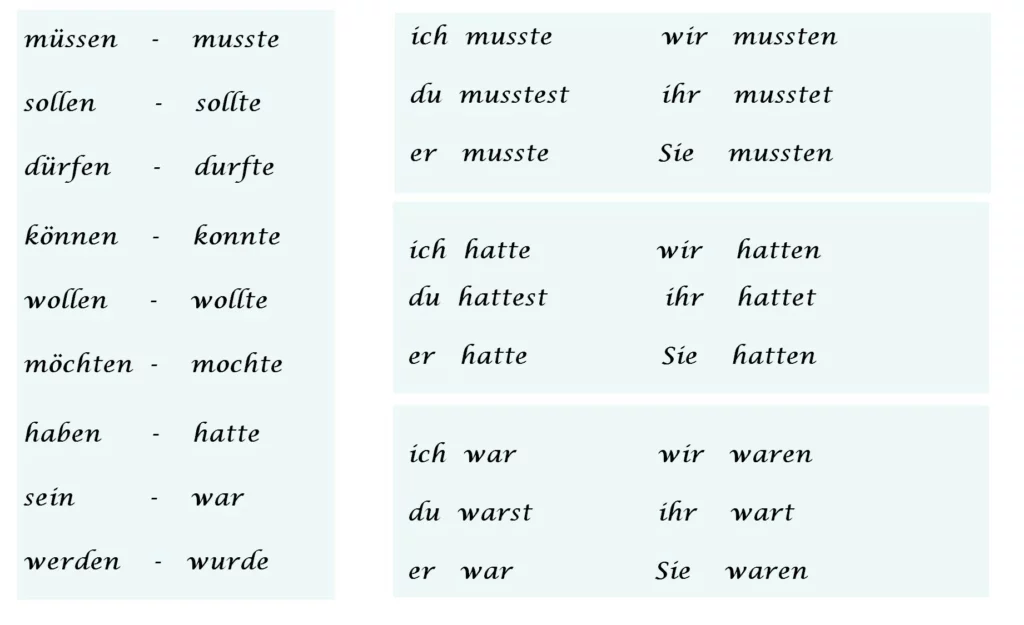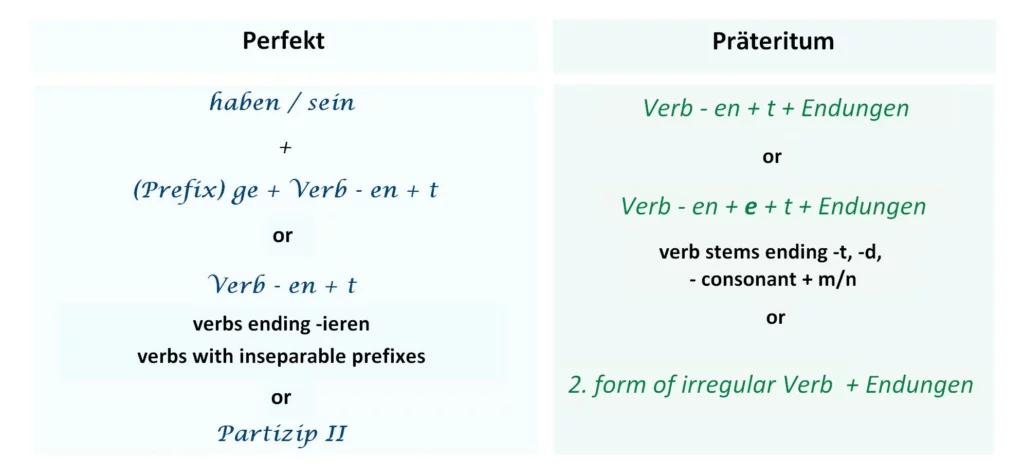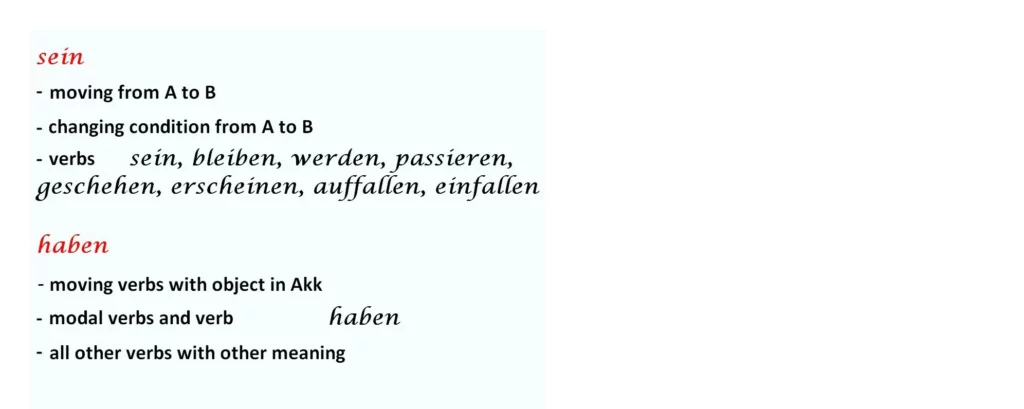Last Updated on November 22, 2023
The past tense in German is covered almost entirely by only two tenses – Perfekt and Präteritum. It’s a master skill if you master the Plusquamperfekt, but in reality, 100 percent of the time you can avoid it. In this topic, we will look at
how the perfect and the preterite differ from each other,
when they use haben or sein in the perfect,
and at the end we will give tables of irregular verbs by group.
Separable verbs in German
Modal verbs in German
SS or ß in German
Negation in German
Conjunctions and connector adverbs – 2. Different word order in German
Basic German. 3. Local prepositions in German
Basic German. 4. Time and prepositions of time in German
Difference between enden and beenden, abschließen, aufhören
German synonyms. Difference between verschieden and unterschiedlich, anders
Past tense in German – Perfekt vs Präteritum (Imperfekt)
1. When to use
Fortunately, German in terms of tenses is much easier than English – you don’t have to think at all, just remember the forms of strong verbs and don’t forget to rearrange the pieces of the predicate to the end of the sentence.
The most general rule: spoken – perfect, written – preterite. But do not forget that colloquial speech can be in written form, and formal, written style can also be in oral form. Hence the additions to the rule.
Preterite in German is used
in written speech (not everyday speech)
in an official speech
in stories about old events (in fairy tales, histories, reports about the past)
in news and journalism (including radio and television)
some verbs are more often used in the present form even in colloquial speech (modal verbs, sein, haben, fixed expressions like Es gibt)
Perfect in German is used
in colloquial speech and informal letters
The perfect has a connection with the present. If the presentation or report (school, scientific) is about events of the recent past, then they rather choose the perfect.
2. Forms
Let me remind you that the stem of a verb is its initial form (infinitive) minus the ending –en.
Preterite
Regular verbs: verb stem + t + personal endings (first, second or third person and singular or plural number)
I said: sag – en + t + e = sagte
if the base of the verb ends in -t, -d, a combination of a consonant and m, n, then a connecting vowel -e- is added before -t
I worked: arbeiten – arbeitete
I calculated: rechnen – rechnete
I spoke: reden – redete
Irregular verbs: second form + personal endings (except 1st and 3rd person singular: I, he, she, it)
Personal endings are red, connecting vowel is green.

Preterite forms of modal and auxiliary verbs (on the left). In addition, there are personal endings in all forms except “ich” and “er, sie, es” (tables on the right).

Perfect forms
haben or sein (changes in the present tense) + uninflected 3rd form of the verb (Partizip II)
Partizip II in regular verbs is formed so:
prefix ge– + stem of the verb + ending -t .
If the verb has a separable prefix, then ge– is placed between it and the root.
holen:
ge + hol (- en) + t = geholt
abholen:
ab + ge + hol (- en) + t = abgeholt
Some regular verbs do not have the prefix ge-:
for verbs with an inseparable prefix (erleben – erlebt)
for verbs ending in -ieren (studieren – studiert)
if the verb has an inseparable prefix to which a separable prefix is attached, then ge– is absent (vorbestellen – vorbestellt: vor is separable prefix, be – inseparable).
For irregular verbs, the participle form must be remembered. Most often it is formed from a modified stem plus the prefix ge– and the ending –en. However, the stem does not always change.
If the verb has an inseparable prefix, then ge- is missing.
bleiben – geblieben
schneiden – ausgeschnitten (aus – separable prefix)
erschrecken – erschrecken (er – inseparable prefix)
fahren – gefahren
In the so-called mixed forms, the suffix -t is retained, but there is also a modified stem: rennen – gerannt.
You do not need to remember that these forms are called mixed, since these forms still need to be memorized, like other forms of irregular verbs.
Modal verbs are rarely used in the perfect, but they nevertheless have forms.
Auxiliary verbs are more often in the perfect, than modal verbs, however preterite forms are more common.
müssen – gemusst
können – gekonnt
dürfen – gedurft
sollen – gesollt
wollen – gewollt
möchten – gemocht
sein – gewesen
haben – gehabt
werden – geworden

Haben or sein
We have two auxiliary verbs because they originally had a specific meaning (classic meaning of the perfect form, which is hardly noticeable today):
sein was used with intransitive verbs (those that cannot have an accusative object) and meant the result of a movement or change
I came = I am now in a new place (I bin gekommen = Ich bin jetzt an einem neuen Ort)
I woke up = I am awake now (Ich bin aufgewacht = Ich bin jetzt wach)
haben was used with transitive verbs and meant something was done to something and now we have the result of that action
I painted a picture = I have a painted picture (Ich habe ein Bild gemalt = ich habe ein gemaltes Bild)
Of course, over time this distinction has become relatively formal, but perhaps this kind of check will help you: whether or not the result can be represented as a sentence with the verb sein.
Sein is used:
– with verbs changing place from point A to point B (without accusative):
fahren,
laufen,
kommen,
schwimmen,
fallen,
rennen,
fliegen,
abbiegen,
springen,
reisen,
begegnen (initially “entgegen gehen”) and others
If a verb in a sentence is used with an accusative object, then the auxiliary verb haben is used
Ich habe das Auto in die Garage gefahren
Pilot hat das Flugzeug nach London geflogen
If the movement is made aimlessly, in place, and not from point A to point B, then haben is used. Therefore tanzen will be with haben.
Ich bin zu der Insel geschwommen
Ich habe im kalten Fluss geschwommen
– with verbs of condition change from condition A to condition B:
einschlafen (awake – > sleeping)
aufstehen, aufwachen (sleeping – > awake)
angehen (was not – > appeared)
sterben
However, if the meaning of the verb does not include an unambiguous change from one condition to another, then it will be haben.
For example, wandeln, verwandeln, ändern (it is not clear what changes there – condition or appearance or something completely different appears).
– with verbs sein, bleiben, passieren, geschehen, erscheinen, werden, einfallen, ausfallen
Some verbs are always used with sein (like bleiben), but many verbs are used with both haben and sein depending on their meaning, and this is indicated in a good dictionary. That is, you can’t always automatically use sein if you have a verb from a list. It is best to carefully study the dictionary entry about this verb and note the meanings with haben if they are regularly used.
10 best online German dictionaries
some examples of verbs that are usually used with sein, but in some meanings with haben
er hat einen gebrauchten Wagen gefahren (he drove, owned a used car)
der Rennfahrer hat in dieser Saison drei Rennen gefahren (took part)
er hat sich (an dem Balken) ein Loch in den Kopf gerannt (got hurt)
das Wildschwein hat den Jäger angegangen (attacked)

3. Perfect and preterite in a sentence
Preterite
The verb takes its usual place (second in the main sentence). Separable prefixes go to the end.
In a subordinate clause, the verb, together with the prefix, goes to the end of the sentence.
Er lernte fleißig jeden Tag.
Sie schlief erst um 12 Uhr ein, weil sie zu spät aus dem Kino kam.
Sie kam zu spät, weil sie ihr Kind vom Kindergarten abholte
Perfect
Auxiliary verbs (haben or sein) take the place of the main verb (second in the main sentence), the participle goes to the end of the sentence.
In a subordinate clause, both parts of the predicate go to the end.
Ich habe gestern gelernt.
Ich bin gestern erst um 12 Uhr eingeschlafen, weil ich zu spät aus dem Kino gekommen bin.
Forms of irregular verbs in groups
Irregular verbs are grouped together to help teach them.
The following are the major groups (the list is not exhaustive).
а – ie / i – a
braten
fallen
halten
lassen
raten
schlafen
empfangen
fangen
briet
fiel
hielt
ließ
riet
schlief
empfing
fing
gebraten
gefallen
gehalten
gelassen
geraten
geschlafen
empfangen
gefangen
laufen
rufen
lief
rief
gelaufen
gerufen
o – ie – o
stoßen
stieß
gestoßen
e – a – o
befehlen
bergen
brechen
empfehlen
erschrecken
gelten
helfen
nehmen
sprechen
stechen
stehlen
sterben
treffen
verderben
werben
werfen
befahl
barg
brach
empfahl
erschrak
galt
half
nahm
sprach
stach
stahl
starb
traf
verdarb
warb
warf
befohlen
geborgen
gebrochen
empfohlen
erschrocken
gegolten
geholfen
genommen
gesprochen
gestochen
gestohlen
gestorben
getroffen
verdorben
geworben
geworfen
i – a – o
beginnen
gewinnen
schwimmen
begann
gewann
schwamm
begonnen
gewonnen
geschwommen
kommen
kam
gekommen
e – a – e
essen
fressen
geben
geschehen
lesen
messen
sehen
treten
vergessen
aß
fraß
gab
geschah
las
maß
sah
trat
vergaß
gegessen
gefressen
gegeben
geschehen
gelesen
gemessen
gesehen
getreten
vergessen
liegen
bitten
sitzen
lag
bat
saß
gelegen
gebeten
gesessen
e – o – o
heben
schmelzen
hob
schmolz
gehoben
geschmolzen
ie – o – o
biegen
bieten
fliegen
fliehen
frieren
genießen
gießen
kriechen
riechen
schieben
schießen
schließen
verlieren
ziehen
bog
bot
flog
floh
fror
genoss
goss
kroch
roch
schob
schoss
schloss
verlor
zog
gebogen
geboten
geflogen
geflohen
gefroren
genossen
gegossen
gekrochen
gerochen
geschoben
geschossen
geschlossen
verloren
gezogen
lügen
trügen
erlöschen
schwören
saugen
log
trog
erlosch
schwor
sog
gelogen
getrogen
erloschen
geschworen
gesogen
ei – ie – ie
bleiben
leihen
reiben
scheiden
scheinen
schreiben
schreien
schweigen
steigen
treiben
weisen
verzeihen
blieb
lieh
rieb
schied
schien
schrieb
schrie
schwieg
stieg
trieb
wies
verzieh
geblieben
geliehen
gerieben
geschieden
geschienen
geschrieben
geschrieen
geschwiegen
gestiegen
getrieben
gewiesen
verziehen
ei – i – i
beißen
gleichen
gleiten
greifen
leiden
pfeifen
reißen
reiten
schleifen
schleichen
schmeißen
schneiden
schreiten
streichen
streiten
weichen
biss
glich
glitt
griff
litt
pfiff
riss
ritt
schliff
schlich
schmiss
schnitt
schritt
strich
stritt
wich
gebissen
geglichen
geglitten
gegriffen
gelitten
gepfiffen
gerissen
geritten
geschliffen
geschlichen
geschmissen
geschnitten
geschritten
gestrichen
gestritten
gewichen
i – a – u
binden
dringen
finden
gelingen
klingen
schwinden
singen
sinken
springen
trinken
winden
zwingen
band
drang
fand
gelang
klang
schwand
sang
sank
sprang
trank
wand
zwang
gebunden
gedrungen
gefunden
gelungen
geklungen
geschwunden
gesungen
gesunken
gesprungen
getrunken
gewunden
gezwungen
a – u – a
backen
fahren
graben
laden
schaffen
schlagen
tragen
wachsen
waschen
buk
fuhr
grub
lud
schuf
schlug
trug
wuchs
wusch
gebacken
gefahren
gegraben
geladen
geschaffen
geschlagen
getragen
gewachsen
gewaschen
Follow me
Mixed verbs (use regular verb ending -t)
brennen
bringen
denken
kennen
nennen
rennen
senden
wenden
brannte
brachte
dachte
kannte
nannte
rannte
sandte
wandte
gebrannt
gebracht
gedacht
gekannt
genannt
gerannt
gesandt
gewandt
Other topics about #German grammar
#Synonyms
#Idioms in German
Test B1 – #DTZ
Verbs with prepositions in German. Preposition um and preposition über
Do you enjoy the site without cookies and maybe without ads? This means that I work for you at my own expense.
Perhaps you would like to support my work here.
Or Cookie settings change: round sign bottom left
